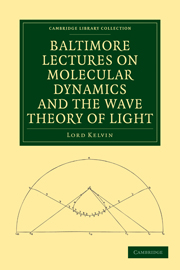Book contents
- Frontmatter
- PREFACE
- Contents
- ERRATA
- NOTES OF LECTURES ON MOLECULAR DYNAMICS AND THE WAVE THEORY OF LIGHT
- ADVERTISEMENT
- LECTURE I
- LECTURE II
- LECTURE III
- LECTURE IV
- LECTURE V
- LECTURE VI
- LECTURE VII
- LECTURE VIII
- LECTURE IX
- LECTURE X
- LECTURE XI
- LECTURE XII
- LECTURE XIII
- LECTURE XIV
- LECTURE XV
- LECTURE XVI
- LECTURE XVII
- LECTURE XVIII
- LECTURE XIX
- LECTURE XX
- APPENDIX A ON THE MOTION PRODUCED IN AN INFINITE ELASTIC SOLID BY THE MOTION THROUGH THE SPACE OCCUPIED BY IT OF A BODY ACTING ON IT ONLY BY ATTRACTION OR REPULSION
- APPENDIX B NINETEENTH CENTURY CLOUDS OVER THE DYNAMICAL THEORY OF HEAT AND LIGHT
- APPENDIX C ON THE DISTURBANCE PRODUCED BY TWO PARTICULAR FORMS OF INITIAL DISPLACEMENT IN AN INFINITELY LONG MATERIAL SYSTEM FOR WHICH THE VELOCITY OF PERIODIC WAVES DEPENDS ON THE WAVE-LENGTH
- APPENDIX D ON THE CLUSTERING OF GRAVITATIONAL MATTER IN ANY PART OF THE UNIVERSE
- APPENDIX E AEPINUS ATOMIZED
- APPENDIX F
- APPENDIX G HYDROKINETIC SOLUTIONS AND OBSERVATIONS
- APPENDIX H ON THE MOLECULAR TACTICS OF A CRYSTAL
- APPENDIX I ON THE ELASTICITY OF A CRYSTAL ACCORDING TO BOSCOVICH
- APPENDIX J MOLECULAR DYNAMICS OF A CRYSTAL
- APPENDIX K ON VARIATIONAL ELECTRIC AND MAGNETIC SCREENING
- APPENDIX L ELECTRIC WAVES AND VIBRATIONS IN A SUBMARINE TELEGRAPH WIRE
- INDEX
LECTURE XX
Published online by Cambridge University Press: 05 March 2012
- Frontmatter
- PREFACE
- Contents
- ERRATA
- NOTES OF LECTURES ON MOLECULAR DYNAMICS AND THE WAVE THEORY OF LIGHT
- ADVERTISEMENT
- LECTURE I
- LECTURE II
- LECTURE III
- LECTURE IV
- LECTURE V
- LECTURE VI
- LECTURE VII
- LECTURE VIII
- LECTURE IX
- LECTURE X
- LECTURE XI
- LECTURE XII
- LECTURE XIII
- LECTURE XIV
- LECTURE XV
- LECTURE XVI
- LECTURE XVII
- LECTURE XVIII
- LECTURE XIX
- LECTURE XX
- APPENDIX A ON THE MOTION PRODUCED IN AN INFINITE ELASTIC SOLID BY THE MOTION THROUGH THE SPACE OCCUPIED BY IT OF A BODY ACTING ON IT ONLY BY ATTRACTION OR REPULSION
- APPENDIX B NINETEENTH CENTURY CLOUDS OVER THE DYNAMICAL THEORY OF HEAT AND LIGHT
- APPENDIX C ON THE DISTURBANCE PRODUCED BY TWO PARTICULAR FORMS OF INITIAL DISPLACEMENT IN AN INFINITELY LONG MATERIAL SYSTEM FOR WHICH THE VELOCITY OF PERIODIC WAVES DEPENDS ON THE WAVE-LENGTH
- APPENDIX D ON THE CLUSTERING OF GRAVITATIONAL MATTER IN ANY PART OF THE UNIVERSE
- APPENDIX E AEPINUS ATOMIZED
- APPENDIX F
- APPENDIX G HYDROKINETIC SOLUTIONS AND OBSERVATIONS
- APPENDIX H ON THE MOLECULAR TACTICS OF A CRYSTAL
- APPENDIX I ON THE ELASTICITY OF A CRYSTAL ACCORDING TO BOSCOVICH
- APPENDIX J MOLECULAR DYNAMICS OF A CRYSTAL
- APPENDIX K ON VARIATIONAL ELECTRIC AND MAGNETIC SCREENING
- APPENDIX L ELECTRIC WAVES AND VIBRATIONS IN A SUBMARINE TELEGRAPH WIRE
- INDEX
Summary
Molecular
§ 200. Considering how well Rankine's old idea of æolotropic inertia has served us for the theory of double refraction, it naturally occurs to try if we can found on it also a thorough dynamical explanation of the rotation of the plane of polarization of light in a transparent liquid, or crystal, possessing the chiral property. I prepared the way for working out this idea in a short paper communicated to the Royal Society of Edinburgh in Session 1870—71 under the title “On the Motion of Free Solids through a Liquid” which was re-published in the Philosophical Magazine for November 1871 as part of an article entitled “Hydrokinetic Solutions and Observations,” and which constitutes the greater part of Appendix G of the present volume. The extreme difficulty of seeing how atoms or molecules embedded in (ether), an elastic solid could experience resistance to change of motion practically analogous to the quasi-inertia conferred on a solid moving through an incompressible liquid has, until a few weeks ago, prevented me from attempting to explain chiral polarization of light by æolotropic inertia. Now, the explanation is rendered easy and natural by the hypothesis explained in §§ 162—164 above and in §§ 204, 205 below and in Appendix A.
- Type
- Chapter
- Information
- Publisher: Cambridge University PressPrint publication year: 2010First published in: 1904

